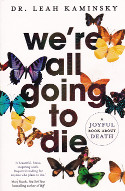
We’re All Going to Die - Book Review
Book Reviews
We’re All Going to Die - Dr Leah Kaminsky (HarperCollins 293 pp)
A Long Time Coming - Melanie Joosten (Scribe 232 pp)
Reviewed by Robin Osborne
Mirroring the demographics of our society, books about ageing, end-of-life-care and death have become increasingly frequent and these works from two well-regarded Australian authors are valuable additions to the burgeoning field.*
Both are well written, brimming with empathy for their subjects, and sharply analytical about the barriers and prejudices faced by Australians as we age.
While commenting on covers may be superficial, I would note the coincidence of both depicting butterflies - do they signify old age, and if so, how? - although in the case of the Kaminsky book an heirloom butterfly brooch makes an appearance.
Dr Kaminsky, a GP, observes that, “During thirty years of practice you get to see a wide range of ailments, a veritable litany of woes. Always at the back of my mind has been a rumbling sense of dread, loosely disguised by a morbid curiosity to know where and when I am going to die.
- Details
- Written by: Robin Osborne

LBH’s new facilities open for viewing - Sat 30 July
A rare chance to see the inside of Lismore Base Hospital’s new emergency department and renal unit without entering for medical treatment will take place this Saturday 30 July, 2016, from 11.00 am-2.00 pm.
The community open day will give visitors a close-up view of the new 51-bay ED and 18-bay renal unit, which comprise part of the Stage 3A phase of LBH’s $260 million redevelopment,
Jointly funded by the NSW and Commonwealth Governments, these are the first sections of works to be completed, and are scheduled to open in late August.
Stage 3B of the redevelopment will include new medical and surgical wards, a new Women’s Care Unit, new operating theatres and central sterilising unit, and a new paediatric ward.
No bookings are required for the open day, and free parking will be available in the new Uralba Street multi-storey carpark. No food or drink will be permitted to be taken on the tour.
- Details
- Written by: Robin Osborne

Paradoxical HILDA says rural kids healthier
Contrary to the perceived wisdom that regional/rural dwellers are generally less healthy than their urban counterparts, the latest survey of Australian households says children in non-urban areas are reportedly healthier than their city cousins, with the latter group undertaking a greater number of GP visits.
Another reported paradox is that activity levels are positively associated with relatively high alcohol consumption (15-42 drinks per week) for males, and moderate alcohol consumption (11-14 drinks per week) for females. Further, being a smoker is not associated with any effects on activity levels for females, while for males it is - “surprisingly”, as the survey observed - associated with a higher activity level than that of non-smokers.
- Details
- Written by: Robin Osborne

Health Minister ‘honoured’ by re-appointment
The first Turnbull government’s Minister for Health and Aged Care, Sussan Ley (‘Lee’) has been re-appointed to the position in the second-term cabinet announced today (19 July).
Prior to the announcement there was speculation that Ms Ley would be shifted from the health role because of a comment during the election campaign about the government’s freeze on Medicare rebates.
The Minister apparently believed the freeze - envisaged by the government to run until at least 2020 - should be ended. However, she said, this was not acceptable to the Finance and Treasury departments.
- Details
- Written by: Robin Osborne

Revalidation and Hume’s guillotine
Philosopher David Hume, in his book “A Treatise of Human Nature” describes how hard it is to derive ought directly from is – that is, how tricky it is to logically demonstrate why things should be done in a certain way. This is often referred to as “Hume’s Guillotine” as a way to demonstrate the severance of "is" statements from "ought" statements.
Now, as you would all be aware, Australian Health Practitioner Regulation Agency (AHPRA), is in the process of arguing that we all should (in fact, be forced to) undergo revalidation on a regular basis. This entails going from the “is“ (concerns about medical practice) to the “ought“ (you must practice in a set way).
- Details
Page 132 of 177















